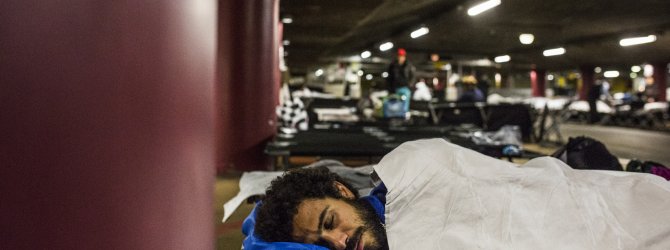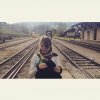-
On the Refugee Route Part V: Thickening Nostalgia, ...
On the Refugee Route Part V: Thickening Nostalgia, Shrinking Patience

After having spent a month following their odyssey from a rural village in Eastern Damascus to the industrial German city of Stuttgart, separating from the Kreker siblings midway through the Balkans was challenging personally. By this point, I had grown emotionally attached to the weathered yet resilient spirits newly exposed to the unforgiving reality. Still, the three young siblings continued to radiate with positivity.
As Alessio (the Sicilian photographer) and I attempted to catch up with their journey through Croatia and Slovenia, Somar shared photos of his surroundings with us. One photo depicted his sisters, Salsabil and Lubna, busying themselves with children in one of the camps. Despite the insecurity and the lack of electricity, Salsabil and her friends used to sing with the children in the neighbourhood and give them lessons in English. For approximately three years, they had grown accustomed to living in a country at war.
Despite it all, their optimism attracted me, but as optimistic as they seemed to me as an outsider, I knew I could not understand what was going on internally. After asking about the challenges they encountered along the way, Somar did reveal the harshness of Opatovac camp in Croatia, where tents were consumed by rain, leaving them floating in a pool of mud. I noticed that Somar seemed to suppress feelings of despair, but on the few occasions he opened up, he expressed that their only solace was in reaching out to those around them and lending a helping hand. Helping others was their way of coping.
While waiting to hear from Somar, Alessio and I attempted to enter the camps where we had thought Somar and his sisters were being kept. In doing so, we risked losing our archive of photo documentation, so we kept our distance until Somar identified the right opportunity for us to re-join the group. That chance offered itself at Klagenfurt train station in southern Austria. Once on board, we met a family from Deir EzZour, a city along the eastern side of Syria, not far from ArRaqqa, the stronghold of the Islamic State (IS). They told us they were caught between IS and Assad controlled areas and that by fleeing they had risked being misperceived as supporters of either party. While rocking her baby – just 21 days old – the mother said she had to cross a mountainous terrain in the deep darkness of the night two days after she had delivered her baby.
As the train sped further west into Europe, the youngsters in the family played local folk songs from their hometown. The mother, who was in her 40s, seemed overwhelmed with nostalgia and began to tear up. Her husband pleaded me to convince her of the benefits of seeking asylum in Germany, but her heart was back home, and the fear of raising her children in a foreign land haunted her.
“How difficult it must be to experience getting uprooted from one’s home country,” I thought. It made me reflect on the experience of my own Circassian ancestors, who were forcefully deported from the Caucasus to the former Ottoman Empire more than 150 years ago.
***
Upon arriving to Salzburg, we were bussed and escorted into the main train station’s parking garage. We were given yellow paper bracelets with numbers that identified us as asylum seekers and traced our sequence among hundreds of asylum seekers passing through Austria in a single day, a substitution to the Balkan states’ service memo system.
The cold was severe, reminding us that we had officially entered the Western region of Europe. We did not have proper blankets or any kind of a heating system. There was a child in our group whose harsh cough continued throughout the night. With every cough I felt my patience for this unfair asylum journey dwindle. Finally, I went to speak to her father, who at that moment had also run out of patience and decided to give up on the hope of reaching Germany and instead hoped to seek asylum in Austria.
After spending two nights with Somar and his sisters at the train parking garage, we heard that they were going to finally be moved across the border to Germany the following morning. To avoid heavy security screening in Germany, Alessio and I decided to separate from the group and wait on the other side of the border in Rosenheim, a German southern border city. We were reunited two days later at Somar’s older brother’s place where they were going to rest and eat homemade food before officially applying for asylum and being allocated a camp as they waited for their residency permits.
As I watched Somar and his siblings chat enthusiastically with their mother back in Syria over Skype, I wondered when they might be able to see one another next, let alone their father who is unable to leave their besieged village until today. I could sense the feeling of nostalgia growing the further we traveled into Europe. Judging from my own experience as a fourth generation Circassian born in Jordan, I believe that nostalgia is passed on to future generations, especially when displacement involves separation from immediate family members. As one journey ends, another one starts for the Kreker siblings in their new country.
Dina Baslan is a Jordanian researcher and former aid worker. In September 2015, she accompanied her Syrian friend Somar Kreker to Europe, hiding among the refugees to nuance her understanding of the migration phenomenon first hand. This is the fifth in a series of articles documenting her journey. Stay tuned for more!

